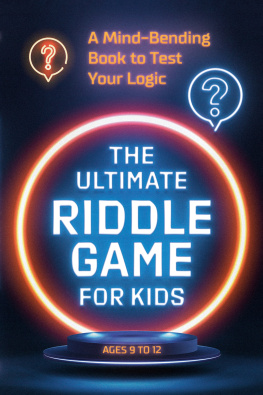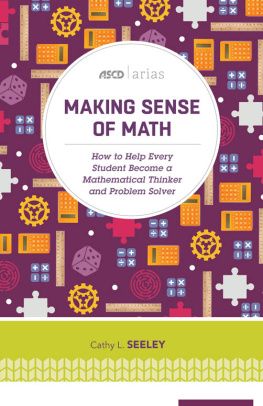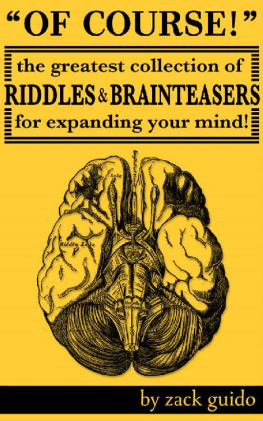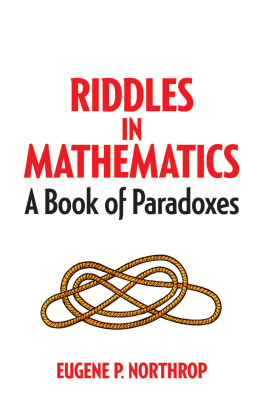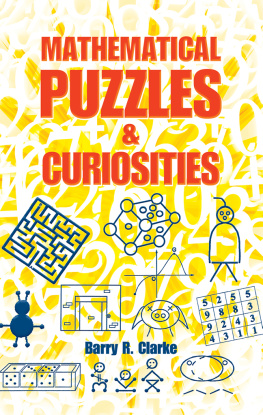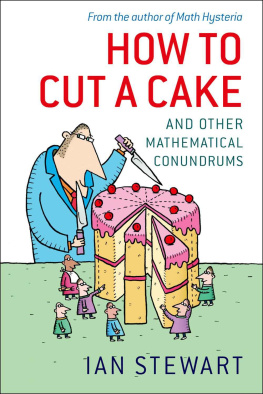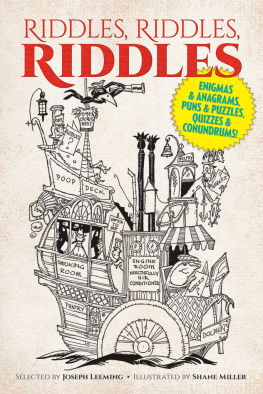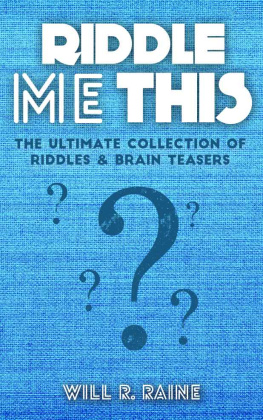Contents
Guide
Pagebreaks of the print version
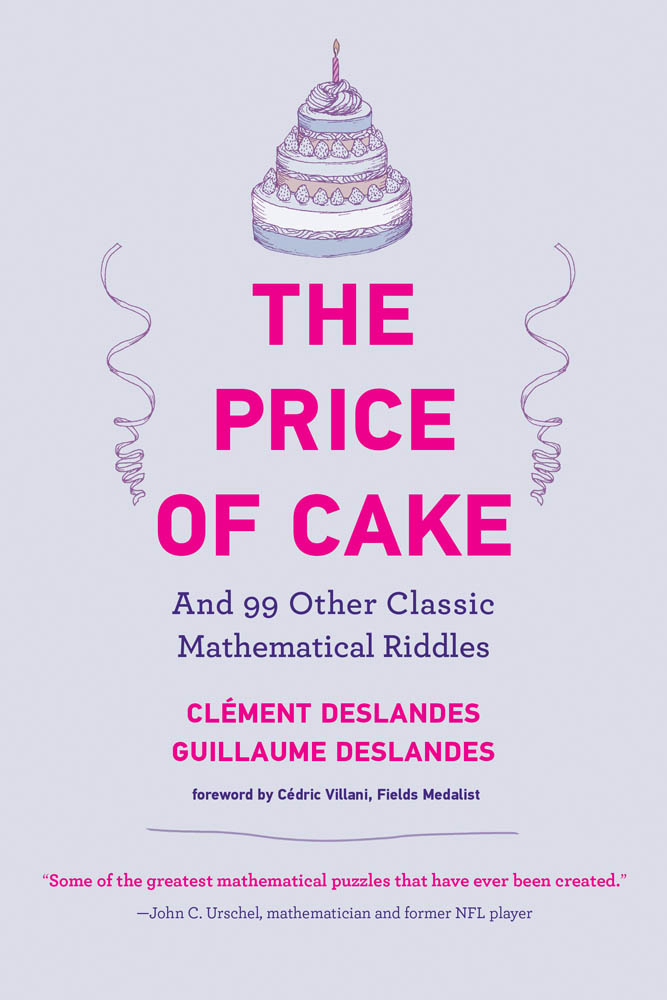
The Price of Cake
And 99 Other Classic Mathematical Riddles
Clment Deslandes and Guillaume Deslandes
illustrated by Laure Mac de Lpinay
translated by Lorenzo Croissant
foreword by Cdric Villani
The MIT Press
Cambridge, Massachusetts
London, England
2023 Massachusetts Institute of Technology
nigmes mathmatiques corriges du lyce Normale Suppublished by EllipsesCopyright 2014, dition Marketing S.A.
All rights reserved. No part of this book may be reproduced in any form by any electronic or mechanical means (including photocopying, recording, or information storage and retrieval) without permission in writing from the publisher.
The MIT Press would like to thank the anonymous peer reviewers who provided comments on drafts of this book. The generous work of academic experts is essential for establishing the authority and quality of our publications. We acknowledge with gratitude the contributions of these otherwise uncredited readers.
Library of Congress Cataloging-in-Publication Data
Names: Deslandes, Clment, author. | Deslandes, Guillaume, author. | Mac de Lpinay, Laure, illustrator. | Villani, Cdric, 1973- writer of preface. | Croissant, Lorenzo, translator.
Title: The price of cake: and 99 other classic mathematical riddles / Clment Deslandes, Guillaume Deslandes; preface by Cdric Villani; art by Laure Mac de Lpinay; translation by Lorenzo Croissant. Other titles: nigmes mathmatiques corriges du lyce Normale Sup.
English Description: Cambridge, Massachusetts: The MIT Press, [2023] | nigmes mathmatiques corriges du lyce Normale Suppublished by Ellipses Copyright 2014, dition Marketing S.A. title page verso. | Includes bibliographical references and index.
Identifiers: LCCN 2022028133 (print) | LCCN 2022028134 (ebook) | ISBN 9780262545242 (paperback) | ISBN 9780262373739 (epub) | ISBN 9780262373746 (pdf)
Subjects: LCSH: Mathematical recreations.
Classification: LCC QA95.D4613 2023 (print) | LCC QA95 (ebook) | DDC 793.74dc23/eng20221007
LC record available at https://lccn.loc.gov/2022028133
LC ebook record available at https://lccn.loc.gov/2022028134
d_r0
Contents
Foreword
Riddles have nourished our history, our literature, our mythology. From Oedipus, to Sherlock Holmes, to Turing, we continue to acclaim those who accomplished their destiny by solving riddles. Real or imaginary, these heroes doubtless embody the human condition, unrelenting in its attempts to decipher the staggering enigma of the world!
In this philosophical quest, scientists have agreed to travel the road together, with order and precision, complete sharing of information, skepticism in a priori reasoning, and control in a posteriori thinking. Their undertaking encountered considerable success, but it has far from exhausted the mysteryeach victory over the unknown engenders its own new crop of questions. Thus, the story of science could be rewritten as an endless succession of enigmas, sometimes solved, and other times, waiting to be solved.
Yet, beyond their solution, riddles also constitute a powerful learning experience in and of themselves. A student defending their thesis, brimming with pride for solving the riddle put forth by their supervisor (or a riddle they gave themselves!), will certainly not contradict me here.
And there is no need to wait until one is in a doctoral program to take advantage of the power of riddles. Like many readers, no doubt, I remember distinctly the delicate mental torture that I inflicted upon myself as a child to solve a problem presented by a teacher or a science magazine for youths. One such problem, a geometry exercise that I finally solved with an ingenious and complex method, earned me bitter chagrin when my teacher showed me a much more simple and elegant solution. Another, regarding the convergence of series, had me fretting for months until the solution appeared to me in my bed, like an epiphany, the day before the start of the school year. Such experiences came to enrich my development at least as much as my classes did.
A riddle is never just an exercise, but an exercise presented with a certain dose of decorum and mystery, whose solution demands some dose of imagination and will impress the mind. And a riddle is also simply the opportunity to work your brain, for a minute, for an hour, or for a week.
What frustration, what exasperation, when one is busy looking for the solution: the eyes glazed-over and the dumbfounded face as ones mind is occupied by a variety of contradictory thoughts racing through, or, perhaps, running in circles. It really sounds familiar Ah, yes, of course Ive already spent an hour on this. In truth, I dont see it. And what if No, it is impossible! Im sure theres a mistake in the statement! But, its inconceivable, how can it Ah its unbelievable how stupid I am! What a twisted mind this guy has! Why on earth am I wasting my time on this thing? I am SURE there is a mistake in the statement! Comic monologues occur in ones brain!
Why do we waste our time? Because we feel so proud when we solve the riddle without peeking at the solution. But also because we feel so good, in spite of the frustration, when we are looking for the solution!
Compendia of riddles are a dime a dozen. But the one by the Deslandes brothers (Mycroft and Sherlock of the math world?) is remarkable in more ways than one.
First, this book is impeccably presented: the riddles are sorted by the concepts at play, funny situations, antiquated or offbeat drawing, hints to set you on the right path, and finally, complete solutions.
But the book is also remarkable because of its variety. Some riddles are famous, whereas others are obscure. Some situations are ridiculous, whereas others are natural. There are problems posed by great mathematicians and problems that arise simply from common sense. Some questions are very old, but others are drawn from recent research articles. And some problems are simple, while others will leave even professional mathematicians drawing a blank.
Above all, this book is remarkable because the riddles in it lead to doing good mathematics. The solutions to these riddles arent simply a way for the authors to show off or entrap the reader, but they serve to form a theoretical base and to develop new techniques and technologies. As the complexity of the solutions in the book progresses, we will see more and more advanced concepts come into play, touching on all fields of mathematics, including logic, combinatorics, analysis, algebra, probability, and geometry.
One could complain that by placing the theory at the end of the book, we are moving backward relative to the classical order in a mathematics course, which goes from theory to applications. And perhaps we are moving in reverse, but one can also respond that it is only a return to the natural order of things, since mathematical concepts have been developed first and foremost to solve problems: to clear up what seemed to have been plucked from a large hat, and to design the techniques that will allow the human mind, evidently never lacking in ingenuity, to solve all kinds of problems that havent even been thought of yet.
Dr. Cdric Villani
Fields Medalist
Preface
This book is a compendium of difficult mathematical riddles. The statements are precise and the solutions are logical, no tricks are involved. Only those elements precisely defined in the statement can be used to find the solution. For example, in the riddle of the principal and the lightbulb, it would be out of the question to use the fact that a lightbulb turned off recently would still be warm, since it is not explicitly stated in the problem that the lightbulb heats up. All events unfold in an ideal mathematical world, and the different protagonists (students, pirates, snakes) are all perfect logicians.


